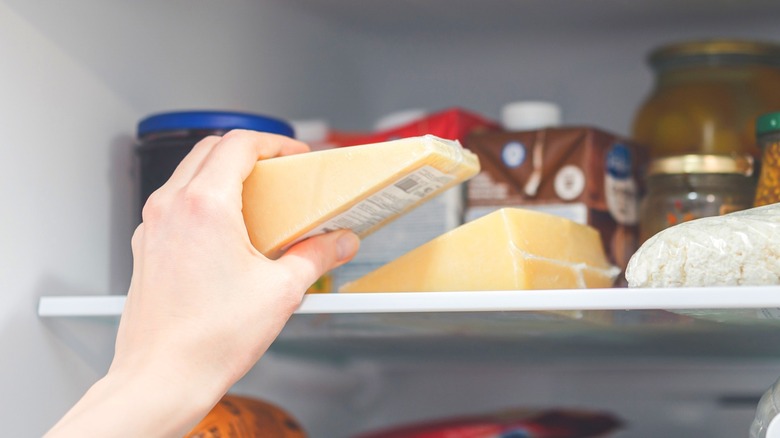Turns Out, Some Cheeses Don't Have To Be Stored In The Fridge
Americans tend to store foods in the fridge by default, so they are often shocked to learn that certain products don't need to be kept at cold temperatures to stay fresh. In other countries, bread, eggs, produce, and cured meat products are often stored in the pantry. Among the most controversial items to keep outside the fridge are dairy products, including cheese. Dairy has a reputation for going off quickly, and once it's spoiled, it's unpleasant to even look at or smell it while you dispose of it. Yet despite fears that leaving cheese out will cause it to go bad, many cheeses are actually meant to be stored at room temperature.
Think of it this way: Many of the cheeses we eat were developed hundreds of years ago, long before refrigeration was invented. Would those mostly-unchanged recipes have been passed on for generations if they had led to mass food poisoning or a waste of valuable milk? When you get your hands on these types of cheeses, save on fridge space and try storing them in your pantry. It might even do wonders for the cheese's texture and flavor.
Hard cheeses are pantry-safe
For the most part, soft or runny cheeses like goat cheese, cottage cheese, or cream cheese need to be refrigerated for safety. These cheeses are called "fresh" cheeses, and are either not aged at all or only for a short amount of time, so they spoil faster. However, harder, drier cheeses might do just fine outside of the fridge. Cheeses like parmesan and Pecorino Romano have a very low water content, so they are less likely to spoil when left out. This is true whether the cheese is grated or left in blocks (though grated cheese will spoil faster).
Other aged cheeses, like aged gouda or cheddar cheese, are also fine when stored in your pantry. They have to be aged varieties, however — those with a low water content and a hard and flaky texture. Younger goudas and cheddars, which are semi-hard and have a firm texture instead of a dry and flaky one, should be refrigerated. They will shed their oils and dry out if left in the pantry for too long.
That being said, you can extend the shelf life of these cheeses by refrigerating them, so if you keep them out of the fridge, make sure to use them sooner rather than later. However, some cheeses really do benefit from sitting at room temperature, making a stronger case for you to leave them out.
Other pantry-safe cheeses
The safest cheeses to leave in the pantry might not be the ones you'd expect. Cheeses with thick bloomy rinds, like Camembert and Brie, form their rinds naturally as a protectant against outside contamination. These rinds are often edible, though not necessarily pleasant. The more important function of rinds is that they allow these cheeses to be stored in any cool, dry place, though their shelf life will depend on the ambient temperature of your kitchen.
A stronger case for room-temperature cheese is that all cheeses should be brought to room temperature over the course of an hour or so before serving.Taking the chill off of a cheese unlocks its full range of flavors. Cheeses like Brie especially benefit from this — they can be somewhat stiff when cold, but at room temp, their proper gooey and creamy texture is unravelled. If you plan to serve a wheel of Brie at a party, you can save time by just keeping it in the pantry. Once these cheeses are cut into, however, they should be stored in the fridge, as their protective coating has been breached.
The final category of pantry-safe cheese is processed cheese. American cheese and other processed dairy products can often be safely stored in your pantry until they are opened. However, you should check the packaging on your cheese to see what the manufacturer recommends.



